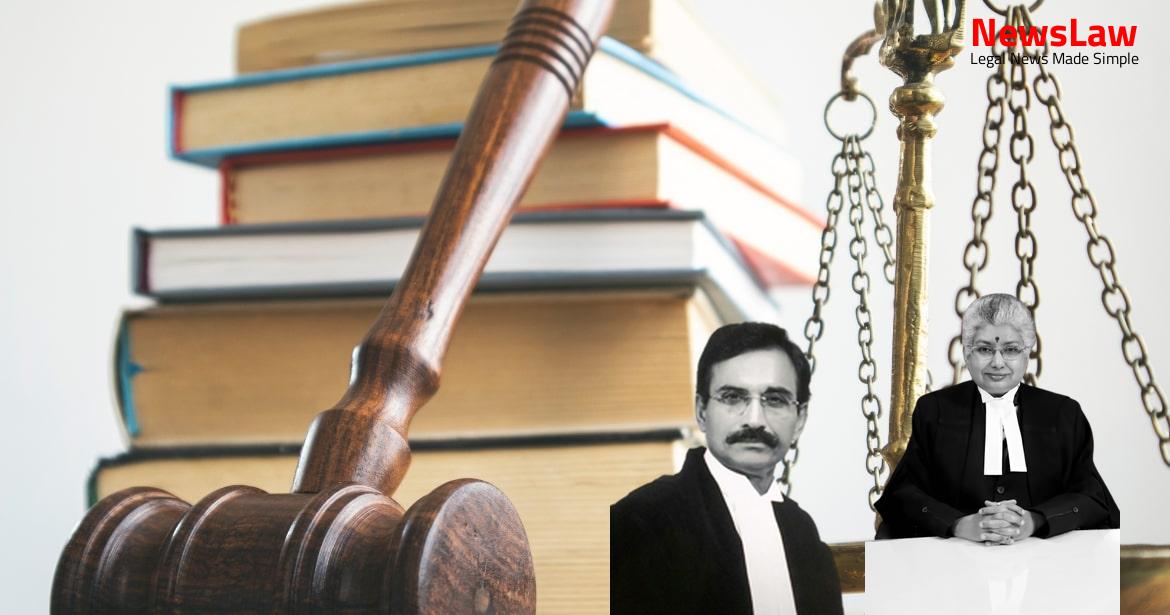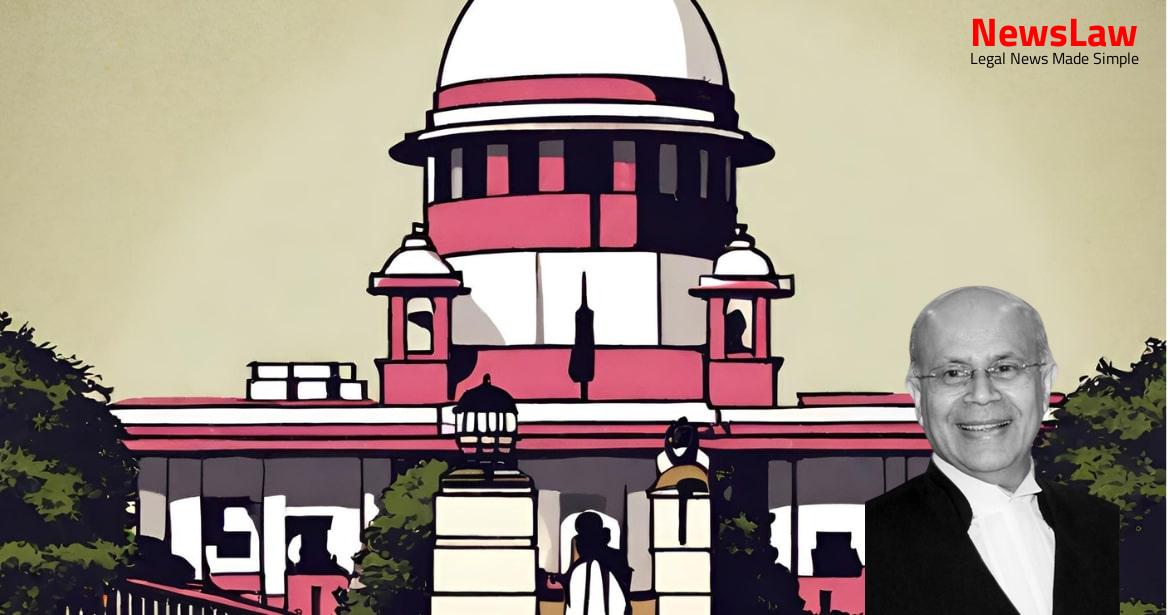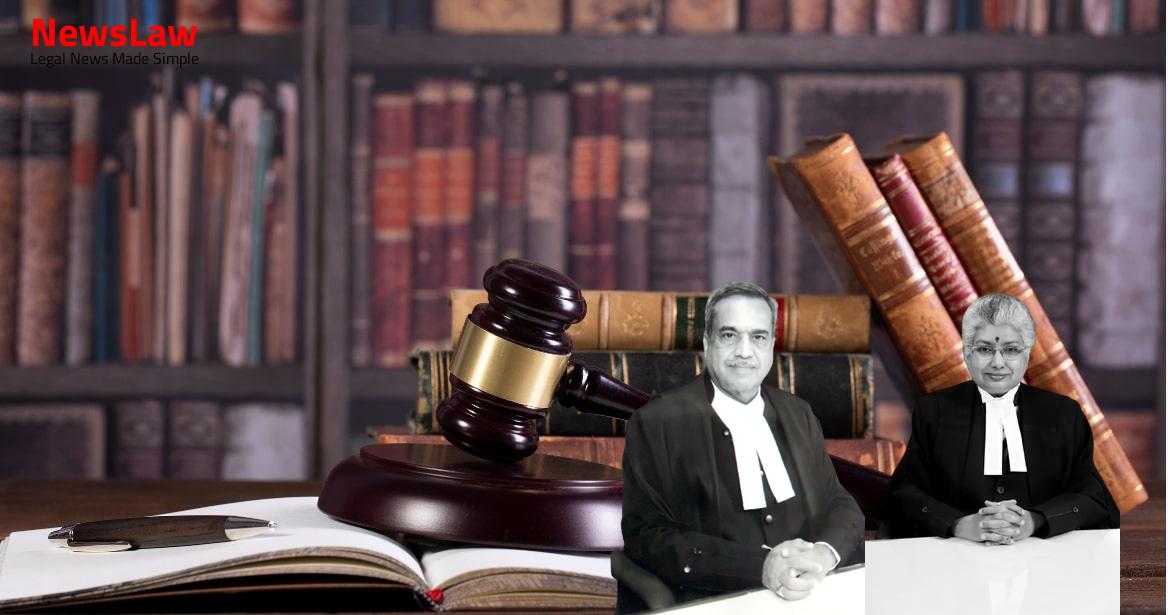Explore the thorough legal analysis undertaken by the court in a capital punishment case, focusing on the scrutiny of witness testimonies. The assessment of witness credibility, inconsistencies in the prosecution’s narrative, and the burden of proof on the prosecution provide insights into the complexities of the legal system. Stay tuned to uncover the nuances of this intriguing case.
Facts
- The trial court framed charges for offences under Section 302/34 of IPC and Section 25/4 of the Arms Act.
- All four accused were convicted under Section 302/34 of IPC and sentenced to death.
- Accused 1, 3, and 4 were also convicted under Section 25/4 of the Arms Act and sentenced to three years rigorous imprisonment.
- A reference was made to the High Court for confirmation of the death sentence.
- The Division Bench of the High Court dismissed the appeals of accused 1, 3, and 4 but acquitted accused 2.
- The present appeals arise from the High Court’s judgment confirming the convictions and death sentences of accused 1, 3, and 4.
- On the fateful day of 23 January, 2014, Momin Khan (A-1) along with his wife Nazra (A-2), Jaikam Khan (A-3), and Sajid (A-4) armed with knives assaulted and killed Mausam Khan (father), Asgari (mother), Shaukeen Khan (brother), Shanno (sister-in-law), Samad (nephew), and Muskan (niece).
- Enmity existed between the deceased and Momin Khan (A-1) and Nazra (A-2).
- A First Information Report (F.I.R.) was registered based on the report of P.W.1-Ali Sher Khan.
- Jaikam Khan (A-3) and Sajid (A-4) were jealous of growing business and had a dispute over land.
- Deceased Mausam Khan had separated properties among his sons and dispossessed Momin Khan (A-1) from the brick-kiln.
- Appellants Momin Khan (A-1), Jaikam Khan (A-3), Sajid (A-4), and P.W.1-Ali Sher Khan were involved in the case.
- P.W.1-Ali Sher Khan and P.W.2-Jaan Mohammad reported the incident to the police.
- Appellant-Sajid (A-4) is the son of appellant-Jaikam Khan (A-3).
- Original Accused No.2-Nazra, wife of appellant-Momin Khan (A-1), was initially convicted and then acquitted by the court.
- Deceased Mausam Khan and P.W.1-Ali Sher Khan were running the brick-kiln with the help of deceased Shaukeen Khan after the incident.
Also Read: Presumption of Genuine Endorsements in Cheque Case
Arguments
- Shri Dama Seshadri Naidu, counsel for accused A-3 and A-4, argues that the prosecution story is unbelievable as there was a partition among the deceased and the accused’s family long ago.
- The reliability of the prosecution witnesses, especially P.W.2-Jaan Mohammad, is questioned by the counsel.
- The close vicinity of the accused to the place of occurrence post-crime is deemed improbable.
- The argument is made that the High Court erred in convicting other accused based on unreliable ocular evidence after discrediting the same witnesses in relation to accused No.2.
- Inconsistencies in the site-plans and lack of crucial information are highlighted, suggesting an adverse inference due to non-examination of independent witnesses.
- Efforts to produce Call Detail Records of key witnesses were rejected, potentially damaging the genuineness of the prosecution’s case.
- The counsel contends that recovery of clothes and weapons was staged, revealing a lack of transparency in the prosecution’s approach.
- Arrests of the accused are questioned as being farcical, and doubts are raised about the conviction of all four accused.
- The absence of enmity between the deceased and accused A-3 and A-4 is emphasized, casting doubt on their involvement in the crime.
- Criticism is directed towards the credibility of the witnesses, urging cautious scrutiny due to their relationship and lack of corroboration.
- The failure to establish a motive for accused A-3 and A-4 is highlighted, further weakening the prosecution’s case.
- Allegations concerning interested witnesses, lack of fingerprint expert’s report, and inconclusive FSL reports are raised to challenge the prosecution’s evidence.
- Failure to inform the police about the incident via mobile phones post-occurrence is considered suspicious.
- Lack of justification for the imposition of capital punishment by both the trial and High Court is pointed out.
- The learned Additional Advocate General representing the respondent-State of Uttar Pradesh argued that both the trial court and the High Court have convicted the accused based on evidence.
- The counsel for P.W.1-Ali Sher Khan mentioned that the Additional Sessions Judge’s conviction of accused No.2 was based on the correct appreciation of evidence.
- The counsel for both sides cited various decisions of this Court in support of their contentions.
- It was argued that the absence of kitchen and bathroom in the site-plans should not discredit the testimonies of P.W.1 and P.W.2.
- The submission was made that the witnesses’ testimonies were supported by the F.I.R. and should be considered reliable despite minor discrepancies.
Also Read: Medical Negligence and Compensation: A Landmark Decision
Analysis
- The analysis focuses on the scrutinization of the testimonies of P.W.1-Ali Sher Khan and P.W.2-Jaan Mohammad, who are closely related to the deceased and the accused No.1-Momin Khan.
- The court emphasizes the need for care, caution, and circumspection while evaluating the evidence provided by closely related witnesses.
- Points out the contradictions and doubts in the testimony of the witnesses, especially regarding the arrest of the accused and the motive behind the crime.
- Raises questions about the reliability of the prosecution’s case due to lack of independent witnesses supporting crucial claims.
- Highlights inconsistencies in the prosecution’s narrative, such as the timing of arrests and the changing of clothes by the accused after the incident.
- Questions the motive presented by the prosecution and points out the need for corroboration in material particulars for conviction.
- Challenges the credibility of the evidence and calls for a thorough examination of all aspects before reaching a conclusion.
- Notes discrepancies in statements made by witnesses and the absence of concrete evidence supporting key assertions.
- Emphasizes the burden on the prosecution to prove the case beyond reasonable doubt and the need for corroboration in unreliable witness testimonies.
- The burden of proof lies on the prosecution to prove the allegations beyond all reasonable doubt.
- Courts should judge the evidence based on probabilities, intrinsic worth, and the animus of witnesses.
- Interested or inimical witnesses’ testimony should be scrutinized but not rejected solely based on bias.
- The burden of proving guilt lies on the prosecution, and only after this burden is discharged, can the accused prove any fact within their special knowledge.
- Section 106 of the Evidence Act does not relieve the prosecution from proving its case beyond all reasonable doubt.
- The burden of proof may be imposed on the accused if they have special knowledge regarding certain facts and fail to offer an explanation.
- The trial court and the High Court should exercise scrutiny, care, and circumspection in capital punishment cases.
- The recovery of blood-stained clothes of the accused does not necessarily prove pre-planning or comprehensive strategy in the crime.
- Conviction and death sentence imposed on the accused are unsustainable in law.
- Prosecution failed to prove the case beyond reasonable doubt.
- Prosecution cannot take advantage of the weakness of the accused’s case.
- Accused not being able to probabilize their defense does not support prosecution’s case.
- The prosecution must stand or fall on its own merits.
Also Read: Remand of Writ Petition for Restoration and Decision on Merits
Decision
- Pending applications stand disposed of.
- Criminal Appeal No. 442 of 2020 filed by P.W.1- Ali Sher Khan is dismissed.
- Criminal Appeal Nos. 440-441 of 2020 filed by Momin Khan (Accused No.1) are allowed.
- Criminal Appeal Nos. 434-436 of 2020 filed by Jaikam Khan (Accused No.3) are allowed.
- Criminal Appeal Nos. 437-439 of 2020 filed by Sajid (Accused No.4) are allowed.
- Momin Khan (Accused No.1), Jaikam Khan (Accused No.3), and Sajid (Accused No.4) are directed to be released.
- Appeal filed by P.W.1-Ali Sher Khan regarding the acquittal of accused No.2-Nazra is without merit.
- The appeals are disposed of with the above decisions.
Case Title: JAIKAM KHAN Vs. THE STATE OF UTTAR PRADESH (2021 INSC 896)
Case Number: Crl.A. No.-000434-000436 / 2020



